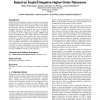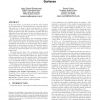199 search results - page 34 / 40 » Intensional Positive Set Theory |
ML
2006
ACM
13 years 7 months ago
2006
ACM
Many domains in the field of Inductive Logic Programming (ILP) involve highly unbalanced data. A common way to measure performance in these domains is to use precision and recall i...
SIGIR
2008
ACM
13 years 7 months ago
2008
ACM
Modeling the beyond-topical aspects of relevance are currently gaining popularity in IR evaluation. For example, the discounted cumulated gain (DCG) measure implicitly models some...
COMGEO
1999
ACM
13 years 7 months ago
1999
ACM
This paper discusses algorithms for labeling sets of points in the plane, where labels are not restricted to some finite number of positions. We show that continuously sliding lab...
COMPGEOM
2006
ACM
14 years 1 months ago
2006
ACM
In the last decade, a great deal of work has been devoted to the elaboration of a sampling theory for smooth surfaces. The goal was to ensure a good reconstruction of a given surf...
ICDT
2010
ACM
13 years 6 months ago
2010
ACM
We propose a greedy algorithm which, given a hypergraph H and a positive integer k, produces a hypertree decomposition of width less than or equal to 3k −1, or determines that H...


